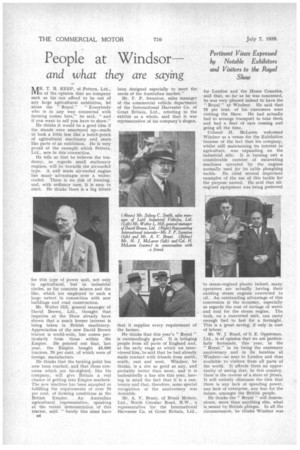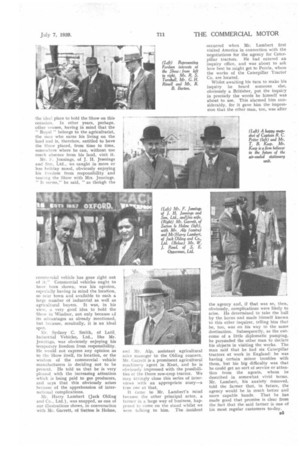People at Windsor—
Page 38

Page 39

If you've noticed an error in this article please click here to report it so we can fix it.
and what they are saying
lk AR. T. B. KEEP, of Petters, Ltd., IViis of the opinion that no company such as his can afford to be out of any large agricultural exhibition, let alone the " Royal." "Everybody who is in any way connected with farming comes here," he said, " and if you want to sell you have to show." He thinks it would be a good idea if the stands were smartened up—made to look a little less like a hotch-potch of agricultural machinery and more like parts of an exhibition. He is very proud of the example which Petters, Ltd., sets in this connection.
He tells us that he believes the tendency, as regards small stationary engines, will be towards the air-cooled type. A well made air-cooled engine has many advantages over a watercooled. There is no risk of freezing, and, with ordinary care, it is easy to start. He thinks there is a big future for this type of power unit, not only • in agricultural, but in industrial circles, as for concrete mixers and the like, which are employed to such a large extent in connection with new buildings and road construction.
Mr. Walter Hill, general manager of David Brown, Ltd., thought that inquiries at the Show already have shown that a much keener interest is being taken in British machinery. Appreciation of the new David Brown tractor is world-wide, but comes particularly from those within the Empire. He pointed out that, last year, the Empire bought 43,000 tractors, 70 per cent, of which were of foreign manufacture.
He thinks that the turning point has now been reached, and that those concerns which are far-sighted, like his company, will give Britain a real chance of getting into Empire markets. The new machine has been accepted as fulfilling the requirements of over 70 per cent, of farming conditions in the British Empire. An Australian agricultural representative, speaking at the recent demonstration of this tractor, said: " Surely this must have B4 been designed especially to meet the needs of the Australian market."
Mr. F. P. Swanton, sales manager of the commercial vehicle department of the International Harvester Co. of Great Britain, Ltd., referring to the exhibit as a whole, said that it was representative of his company's slogan,
that it supplies every requirement of the farmer.
He thinks that this year's " Royal " is outstandingly good. It is bringing people from all parts of England and, at the early stage at which we interviewed him, he said that he had already made contact with friends from north, south, east and west. Windsor, he thinks, is a site as good as any, and probably better than most, and it is undoubtedly a fine site this year, having in mind the fact that it is a centenary and that, therefore, some special recognition of the anniversary was desirable.
Mr. A. V. Brunt, of Brunt Motors, Ltd., North Circular Road, N.W., a representative for the International Harvester Co. of Great Britain, Ltd., for London and the Home Counties, said that, so far as he was concerned, he was very pleased indeed to have the " Royal" at Windsor. He said that 75 per cent. of his customers were visiting the Show. He had actually had to arrange transport to take them and had a fleet of cars coming and going all the time,
Colonel H. McLaren welcomed Windsor as a venue for the Exhibition because of the fact that his company, whilst still maintaining its interest in agriculture, was expanding on the industrial side. It is turning out a considerable number of excavating machines operated by the engines normally used for its cable ploughing tackle. He cited several important examples of the use of this tackle for the purpose named. He said that oilengined equipment was being preferred
to steam-engined plants: indeed, many operators are actually having their existing steam engines converted to oil. An outstanding advantage of this conversion is the economy, especially as regards the cost of cartage of water and coal for the steam engine. The tank, on a converted unit, can carry • enough fuel to last for a fortnight. This is a great saving, if only in cost of labour.
Mr. W. J. Rand, of S. E. Opperman, Ltd.. is of opinion that we are particularly fortunate, this year, in the " Royal," in its being the centenary anniversary and in its location at Windsor—so near to London and thus available to visitors from all parts of the world. It affords them an opportunity of seeing that, in this country, there is the reverse of a state of jitters. It will entirely eliminate the idea that there is any lack of spending power, any lack of enterprise, any fear for the future, amongst the British people.
He thinks the " Royal " will demonstrate, more than anything else, what is meant by British phlegm. In all the circumstances, he thinks Windsor was the ideal place to hold the Show on this occasion. In other years, perhaps, other venues, having in mind that the " Royal " belongs to the agriculturist, the man who earns his living on the land and is, therefore, entitled to have the Show placed, from time to time, somewhere where he can, without too much absence from his land, visit it.
Mr. F. Jennings, of J. H. Jennings and Son, Ltd., we caught in more or less holiday mood, obviously enjoying his freedom from responsibility and touring the Show with Mrs. Jennings. " It seems," he said, "as thobgh the commercial vehicle has gone right out of it." Commercial vehicles ought to have been shown, was his opinion, especially having in mind the location, so near town and available to such a large number of industrial as well as agricultural buyers. It was, in his view, a very good idea to hold the Show in Windsor, not only because of its advantages as already mentioned, but because, scenically, it is an ideal spot.
Mr. Sydney C. Smith, of Lath.. Industrial Vehicles, Ltd., like Mr. Jennings, was obviously enjoying his temporary freedom from responsibility. He would not express any opinion as to the Show itself, its location, or the wisdom of the commercial vehicle manufacturers in deciding not to be present. He told us that be is very pleased with the increasing attention which is being paid to gas producers, and says that this obviously arises because of the apprehension of international complications, Mr. Harry Lambert (Jack Olding and Co., Ltd.), was snapped, as one of our illustrations shows, in conversation with Mr. Garrett, of Sutton le Holme, and Mr. Alp, assistant agricultural sales manager to the Olding concern. Mr. Garrett is a prominent agricultural machineryagent in Kent, and he is obviously impressed with the possibilities of the Deere row-crop tractor. We may fittingly close this series of interviews with an appropriate story—a true one at that.
It came to Mr. Lambert's mind because the other principal actor, a farmer in a large way of business, happened to come on the stand whilst we were talking to him. The _incident occurred when Mr. Lambert first visited America in connection with the negotiations for the agency for Caterpillar tractors. He had entered an inquiry office, and was about to ask bow best he might get to Peoria, where the works of the Caterpillar Tractor Co. are located.
Whilst awaiting his turn to make his inquiry he heard someone else, obviously a Britisher, put the inquiry in precisely the words he himself was about to use. This alarmed him considerably, for it gave him the impression that the other man, too, was after the agency and, if that was so, then, obviously, complications were likely to arise. He determined to take the bull by the horns and made himself known to this other inquirer, telling him that he, too, was on his way to the same destination. Subsequently, as the outcome of a little diplomatic pumping, he persuaded the other man to declare his objects in visiting the works. The man said that he had six Caterpillar tractors at work in England: he was having certain minor troubles with them, but his big difficulty was that he could get no sort of service or attention from the agents, whom he described in somewhat vivid terms. Mr. Lambert, his anxiety removed, told the farmer that, in future, the agency would he in much better and more capable hands. That he has made good that promise is clear from the fact that the said farmer is one of his most regular customers to-day.




















































































